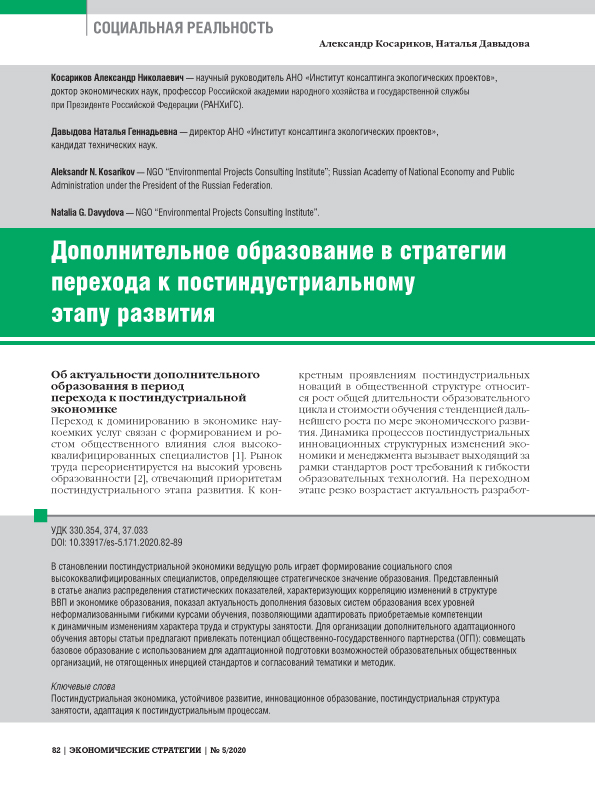Supplementary Education Within Transition Strategy Towards Post-Industrial Development Stage
DOI: 10.33917/es-5.171.2020.82-89
The lead role in the post-industrial economy’s establishment of the social layer of highly qualified specialists’ formation determines the strategic importance of education. The article presents an analysis of the statistical indicators distribution characterizing the correlation of changes in the structure of GDP and economics of education. The analysis showed the relevance of supplementing basic education systems at all levels with informal flexible training courses. These courses allow adapting the acquired competencies to dynamic changes in the nature of labor and the structure of employment. The prospects of attracting potential of public-state partnership for the organization of additional adaptive training are considered. In such a case, basic education is combined with capabilities of educational public organizations that are not bound by the inertia of standards and agreeing on topics and methods
References:
1. Toffler E. Tret’ya volna [Third Wave]. Moscow, AST, 2004.
2. Karpenko O.M., Bershadskaya M.D., Voznesenskaya Yu.A. Pokazateli urovnya obrazovaniya naseleniya v stranakh mira: analiz dannykh mezhdunarodnoi statistiki [Indicators of the Population Educational Level in Countries Throughout the World: International Statistics Analysis]. Sotsiologiya obrazovaniya, 2008, no 6, pp. 4–20.
3. Reiting stran mira po urovnyu raskhodov na obrazovanie [Ranking of Countries Worldwide in Terms of Spending on Education]. The World Bank Development Indicators’2016, available at: https://gtmarket.ru/ratings/expenditure-on-education/info.
4. Dolya zanyatykh v sfere uslug. 2018 [The Share of Employed in the Service Sector. 2018]. EconomicData.ru, available at: https://www.economicdata.ru/economics.php?menu=macroeconomics&data_type=economics&data_ticker=ServicesEmploy.
5. Reiting stran po prodolzhitel’nosti obucheniya. 2018 [Ranking of Countries by Schooling Duration. 2018]. NONEWS, available at: https://nonews.co/directory/lists/countries/years-schooling.
6. Kosarikov A.N. Vliyanie postindustrial’nykh protsessov na dinamiku chislennosti naseleniya [Impact of Post-Industrial Processes on Population Dynamics]. Obshchestvo i ekonomika, 2019, no 9, pp. 90–94.
7. Botkin J., Elmandra M., Melitza M. No limits to learning. Oxford, 1979.
8. Volkov A.E., Kuz’minov Ya.I., Remorenko I.M., et al. Rossiiskoe obrazovanie – 2020: model’ obrazovaniya dlya innovatsionnoi ekonomiki [Russian Education — 2020: Educational Model for the Innovation Economy]. Voprosy obrazovaniya, 2008, no 1, pp. 32–64.
9. Rethinking education: towards a global common good. UNESDOC, 2015, available at: https://unesdoc.unesco.org/ark:/48223/pf0000232555.
10. Asmolov A.G., Gusel’tseva M.S. Generirovanie vozmozhnostei: ot chelovecheskogo kapitala — k chelovecheskomu potentsialu [Generating Opportunities: from Human Capital to Human Potential]. Obrazovatel’naya politika, 2019, no 4, pp. 6–16.
11. Voko Mochizuki, Nandini Chaterjee Singh. Rethinking Learning, MGIEP, 2019.
12. Rossiiskii natsional’nyi yuniorskii vodnyi konkurs – 2020 [Russian National Junior Water Competition — 2020]. Institut konsaltinga ekologicheskikh proektov, available at: http://www.eco-project.org/water-prize/
13. Issledovanie: rossiiskie podrostki bespokoyatsya ob ekologii i obrazovanii v strane i ne interesuyutsya politikoi: Sotsiologicheskii opros agentstva “Mikhailov i Partnery. Analitika” – 2019 [Research: Russian Teenagers are Worried About the Environment and Education in the Country and are Not Interested in Politics: Sociological Survey of “Mikhailov & Partners. Analytics” Agency – 2019]. Takie dela, 2019, November, 2, available at: https://takiedela.ru/news/2019/11/02/issledovanie-podrostkov/
14. Kosarikov A.N., Kokorin A.O. Vliyanie postindustrial’nykh protsessov na mirovuyu energetiku i vybrosy CO2 [Impact of Post-Industrial Processes on the World Power Engineering and CO2 Emissions]. Ekonomicheskie strategii, 2018, no 1, pp. 142–149.
15. Davydova N., Polosin A., et al. Public involvement in the discussion on nuclear energy, the environment and climate change: the case of the ROSATOM Public Council’s project “Green Square”. International Conference on climate change and the role of nuclear power. IAEA, Vienna, 2019, available at: http://ecoproject.org/data/upload/CN275-81.-20191013050229.pdf.
16. Voda bez plastika: Katalog finalistov, 2019 [Plastic-Free Water: Finalists Catalog, 2019]. Rossiiskii natsional’nyi yuniorskii vodnyi konkurs, Moscow, 2019, available at: http://www.eco-project.org/data/upload/Katalog_finalistov-2019_Vodnyy_konkurs.-20190422050906.pdf.
17. Perechen’ regional’nykh proektov, 2019 [List of Regional Projects, 2019]. Rossiiskii natsional’nyi yuniorskii vodnyi konkurs. Moscow, 2019, available at: http://www.eco-project.org/data/upload/PRP-2019.-20190422051821.pdf.



